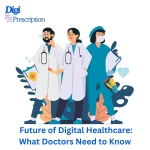 Future of Digital Healthcare: What Doctors Need to Know
Future of Digital Healthcare: What Doctors Need to Know
The future of healthcare is being shaped by rapid advancements in digital technology. From artificial intelligence (AI) and telemedicine to wearable health devices, digital tools are transforming how doctors diagnose, treat, and manage patient care. This blog explores the key trends shaping the future of digital healthcare and what doctors need to know to stay ahead in this evolving landscape.
Key Trends in Digital Healthcare
1. Artificial Intelligence (AI) in Diagnosis and Treatment
AI is revolutionizing healthcare by improving diagnostic accuracy and optimizing treatment plans.
- Applications for Doctors:
- Early detection of diseases using AI algorithms for imaging.
- Personalized treatment plans based on predictive analytics.
- AI-powered virtual assistants to streamline administrative tasks.
2. Telemedicine and Remote Care
Telemedicine has grown exponentially, offering convenience and access to care.
- Why It Matters:
- Doctors can consult patients across geographic barriers.
- Reduces the need for in-person visits, saving time and resources.
- Offers flexibility with live video consultations and digital follow-ups.
3. Integration of Wearable Health Devices
Wearable devices like smartwatches and fitness trackers provide real-time health data.
- Impact on Practice:
- Continuous monitoring of vitals such as heart rate and blood pressure.
- Early warnings for conditions like arrhythmia or hypertension.
- Improved patient engagement through health tracking.
4. Blockchain for Secure Patient Data Management
Blockchain technology enhances data security and interoperability.
- Benefits for Doctors:
- Secure sharing of patient records across systems.
- Reduced risk of data breaches and fraud.
- Improved patient trust through transparent data management.
5. Robotic Surgery and Automation
Automation is extending to surgical procedures, offering precision and efficiency.
- How It’s Changing Healthcare:
- Robotic-assisted surgeries improve accuracy and recovery times.
- Automation of repetitive tasks allows doctors to focus on patient care.
How Digital Healthcare Benefits Doctors and Patients
1. Enhanced Efficiency
Digital tools automate time-consuming tasks, enabling doctors to see more patients and reduce burnout.
2. Improved Patient Outcomes
Personalized care through AI and real-time data monitoring ensures better health management.
3. Greater Accessibility
Telemedicine and remote monitoring expand access to healthcare for underserved populations.
4. Cost Savings
Digital solutions reduce administrative and operational costs for clinics and hospitals.
Challenges and Considerations
- Data Privacy: Doctors must adopt secure systems to protect sensitive patient information.
- Digital Literacy: Continuous training is essential to stay updated on emerging technologies.
- Implementation Costs: Initial investment in digital tools can be high for smaller practices.
- Ethical Concerns: AI and automation should complement—not replace—human decision-making.
Preparing for the Future of Digital Healthcare
1. Stay Informed:
Follow industry trends and updates on emerging technologies like AI, blockchain, and robotics.
2. Invest in Training:
Ensure you and your staff are trained to use new digital tools effectively.
3. Embrace Telemedicine:
Adopt telemedicine platforms to offer flexible care options for your patients.
4. Partner with Reliable Providers:
Choose trusted digital healthcare platforms that offer secure and user-friendly solutions.
5. Focus on Patient-Centric Care:
Use technology to enhance—not replace—the human touch in healthcare.
Conclusion
The future of digital healthcare holds immense potential for improving the quality, accessibility, and efficiency of medical care. By understanding and embracing these technological advancements, doctors can stay ahead of the curve, provide exceptional care, and adapt to the evolving needs of patients. As the healthcare landscape continues to transform, those who integrate digital tools thoughtfully into their practice will be best positioned for success.
